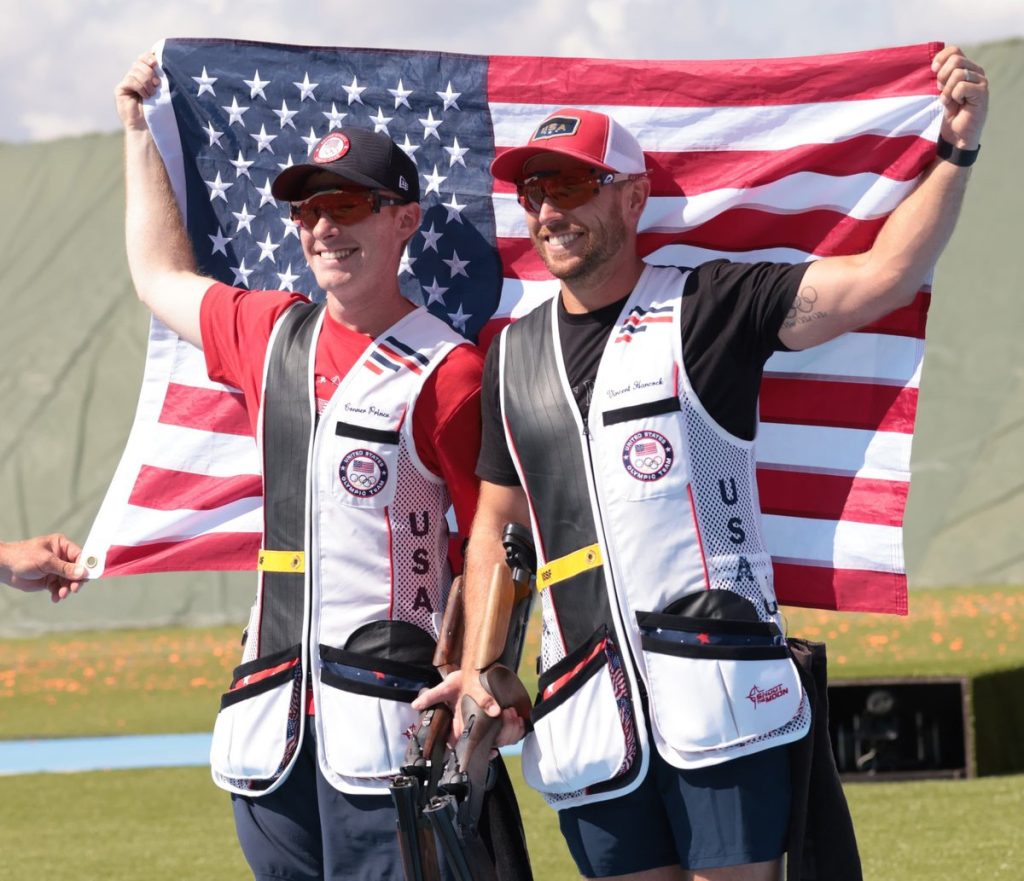
Winning a first gold medal is beyond special. That’s what Vincent Hancock did in Beijing in 2008.
Winning, the second…when you weren’t expected to in London…and then falling flat on your face in Rio, where you were the favorite…but getting back up on the horse and taking your third gold medal after a mental/mechanical lapse in the fifth round of qualifying in Tokyo that almost saw you miss the medal round altogether and then dominated, that was epic.
Before this week, that was the short summary of Hancock’s Olympic career.
Now, by any measure, a stellar Olympic career become historic as the 35-year-old has ascended to another level with a fourth Olympic gold in Paris after defeating his student and fellow American competitor Conner Prince, who took the silver.
The historic aspect is that Hancock has joined Katie Ledecky (USA, swimming) Al Oerter (USA, discus), Paul Elvstroem (Denmark, sailing one-person class), Carl Lewis (USA, long jump), Michael Phelps (USA, 200m individual medley), and Mijain Lopez (Cuba, Greco-Roman heavyweight) as the seventh athlete to win four medals in the same event in four different Olympics.
“Knowing that I’ve been able to do what I’ve done in this sport and be able to get four and be able to just have my name in the same Echelon as theirs, that’s special to me,” Hancock said, entering an elite club.
The win came on the 60th clay of the finals, just seconds after Prince missed the 57th bird to open the door for Hancock to shoot a clean cycle of 2-2 to win the gold.
Hancock was firmly in control after Friday’s first day of competition, missing none of the 75 targets and sitting at the top of the rankings.
In the second round of qualifying on Saturday, Hancock missed a bird in both the fourth and fifth rounds and was fourth on the ranking going into the finals, with Prince on top of the board.
There were solid performers in front of him; Tammaro Cassandro of Italy, Yuan Meng Lee of Taiwan, and Prince, who missed only one target in the first qualifying round and then hit 108 in a row going into the finals.
Hancock took control by not missing a target in the first stage and led by one after the first 20 targets. Still, in stage 2, the first elimination round, Hancock missed two targets in five and was in a position where, since you can’t play defense, you must continue to hit targets. Hancock wouldn’t miss another as he slowly moved back into medal contention, hitting the last 26 birds as those above him fell away.
“It’s been tiring. I’m being reminded. I’m getting old. I’ve been doing this for a long time,” Hancock said, with a gold medal around his neck and standing next to the 24-year-old Prince.
For Hancock, the win came with some trepidation. As he transitions into the job of coach and competitor, the pulls on each part of his chosen profession can create an equilibrium that is sometimes off-kilter. That was the case after the June World Cup in Lonato, Italy. Hancock missed a target in four of the five rounds and missed the finals, finishing 18th, while his student, Prince, won a silver medal.

With less than two months before the Olympics, Hancock knew he had work to do if he was going to medal in Paris and, at the same time, would need to put the focus on himself because he needed more time to be ready for the Olympics.
“I saw some flaws in my game, and I’m like, it’s not acceptable,” Hancock said of how he felt after the World Cup in Italy. You’re coaching others, and you’re not able to do the things you needed to do because you haven’t been paying close enough attention to yourself. And so I just kind of reset my mindset.”
Hancock said he believed if he worked his butt off, as he put it, to fix himself, then he would have a chance for a medal.
“Okay, it’s a crapshoot, like, if it all hits perfectly, I’ll win gold,” Hancock said of how he assessed his chance. “If it doesn’t, I can still win a medal. And that’s still okay. Because winning a medal at the Olympics is totally fine. Gold, silver, bronze, it doesn’t matter. You’re still an Olympic medalist, and you’ll always be an Olympic medalist.”
Everything fell into place and his competitors missed when he needed someone to miss. Yuan missed two of four targets in the second stage of elimination, making him irrelevant and giving the USA gold and silver.
Or Cassandro, after missing just one in the first stage, missed three of five in the elimination stage, opening the door for the two Americans.
Hancock’s Olympics aren’t done. With Skeet Mixed Team starting on Monday he will compete with another student, newly minted Austen Smith.
Hancock says he has one more Olympics in him. “I don’t want to think about it right now. LA is there, and then that’s it for me,” Hancock said of future Olympics. I’ll go through LA, I was actually intending to probably retire after this one. But when we found out that it was going to be in LA, I said to myself, I’m like, ‘Okay.’
I’m going to have to take some time off after this. And I fully intend to, but I would like to go back and compete in an Olympics on US soil because what better place to retire than on home ground and, hopefully, I can defend again.”



Were I still a drinker, I’d hoist one in his honor.
Cheers!
It ain’t booze, but I’ll toast him with a caffeine free diet coke.